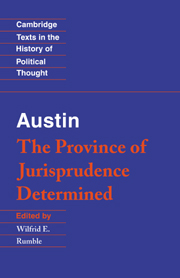Book contents
- Frontmatter
- Contents
- Acknowledgements
- Introduction
- Note on the text
- Chronology of John Austin's life
- Selected bibliography
- Biographical notes
- The Province of Jurisprudence Determined
- Abstract of Lectures
- Analysis of Lectures
- Lecture I.
- Lecture II.
- Lecture III.
- Lecture IV.
- Lecture V.
- Lecture VI.
- Index
- Cambridge Texts in the History of Political Thought
Analysis of Lectures
Published online by Cambridge University Press: 02 December 2009
- Frontmatter
- Contents
- Acknowledgements
- Introduction
- Note on the text
- Chronology of John Austin's life
- Selected bibliography
- Biographical notes
- The Province of Jurisprudence Determined
- Abstract of Lectures
- Analysis of Lectures
- Lecture I.
- Lecture II.
- Lecture III.
- Lecture IV.
- Lecture V.
- Lecture VI.
- Index
- Cambridge Texts in the History of Political Thought
Summary
Laws proper, or properly so called, are commands; laws which are not commands, are laws improper or improperly so called. Laws properly so called, with laws improperly so called, may be aptly divided into the four following kinds.
The divine laws, or the laws of God: that is to say, the laws which are set by God to his human creatures.
Positive laws: that is to say, laws which are simply and strictly so called, and which form the appropriate matter of general and particular jurisprudence.
Positive morality, rules of positive morality, or positive moral rules.
Laws metaphorical or figurative, or merely metaphorical or figurative.
The divine laws and positive laws are laws properly so called. – Of positive moral rules, some are laws properly so called, but others are laws improper. The positive moral rules which are laws improperly so called, may be styled laws or rules set or imposed by opinion: for they are merely opinions or sentiments held or felt by men in regard to human conduct. A law set by opinion and a law imperative and proper are allied by analogy merely; although the analogy by which they are allied is strong or close. – Laws metaphorical or figurative, or merely metaphorical or figurative, are laws improperly so called. A law metaphorical or figurative and a law imperative and proper are allied by analogy merely; and the analogy by which they are allied is slender or remote.
- Type
- Chapter
- Information
- Austin: The Province of Jurisprudence Determined , pp. 10 - 17Publisher: Cambridge University PressPrint publication year: 1995
- 3
- Cited by



